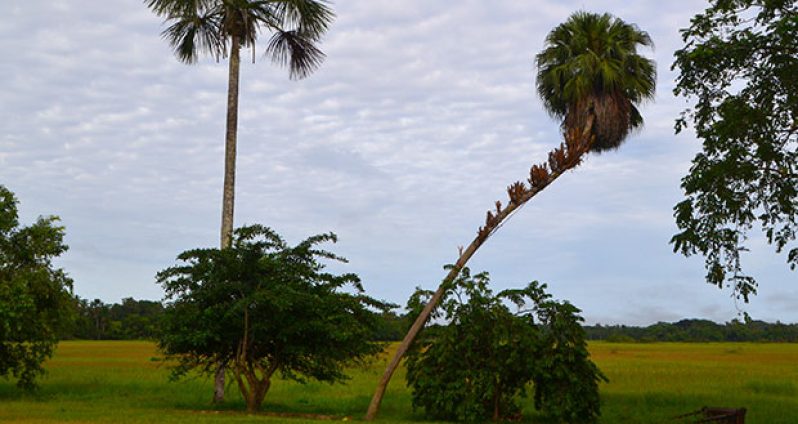THAT Saturday morning, the sun rose in the distance and a phone call came from a friend. The planned trip involved a canoe, and ‘canoeing’ in the waters of the Moruca was an adventure one most definitely looks forward to while in this exotic region of the North West District. The Destination: Acquero.Once the administrative capital of Moruca, Acquero is derived from the Arawak word “Akyorro”, which is a condensed form of the word most persons fondly known as “korro”, the fruit from the palm trees.

The community is located approximately five minutes’ drive downriver from Kumaka, the “capital” of Moruca.
Our journey started by foot from the Kumaka Guest House. On the way, several men stood on the iconic Moruca Bridge, which connects Kumaka with San Jose on the other side, awaiting the arrival of fishermen, who brought crabs and the more expensive species of fish, such as the famous “gilbakka”.
Across at San Jose, persons walked by business-like, and minutes later, after a few turns, the road ahead led to Cabucalli landing, a small port off the ‘island’ of Cabucalli. Almost all the communities here are called ‘islands’ since they are all surrounded by water in the wet-savannah lands between them.
At Cabucalli, a search commenced for a paddle or two, since a canoe was nearby.
While searching for paddles, two padlocks on chains at the bow of the canoe were noticed. Canoeing was now out of the question that morning.
The sun’s light was now blistering the cool waters of the Moruca River, and Option B centred on hitching a ride with passing speedboats — not the idea which was planned. Up ahead, a speed-boat appeared and a visibly intoxicated man sat at the front while the boatman asked our destination.

Having boarded the boat, the destination was now Acquero. The intoxicated man raised a few questions, including the price of the camera I carried, the type of work one does while working for a newspaper; he voiced his opinion on a football match played the day before, and detailed what he planned on doing when he reached home.
At first glance, Acquero appeared very quiet. Not much activity seemed probable here. The presence of a dog at the front near the revetment on the community’s periphery with the river was the only movement on arrival there. At the edges of the community were a few Government homes, all occupied by public sector employees; the Government guest house; a building which once housed a school, and a road ahead.
The walk from the landing to the first household was characterised by chirping birds, insects in the bushes nearby, light sunlight, and a dog which did not seem too friendly. The dog belonged to Teacher Attie, a gentle senior citizen whose “granny characteristics” leaves a lasting impression on one’s mind.
We were warmly welcomed into her home, and Teacher Attie and her husband sat down and offered information on Moruca. She said that Acquero was divided into “Little Acquero” and “Big Acquero”, two sections which were later bridged by road.
“Little Acquero” is currently at the front of the community, where one disembarks on arrival. “Big Acquero” is where Teacher Attie and another 12 of the 14 families of the community reside.
“It used to have water between the two, and a dam was built up between them,” she said of the two sections of the community.
According to her, at the front of the community, “Little Acquero”, where the quarters of the Assistant District Commissioner (now the Assistant Regional Executive Officer). The official at the time was resident at Mabaruma, the region’s administrative capital.
A large building housed a dispensary, the Acquero Post Office and the Acquero Police Station. Those public agencies are now located at Kumaka; however, their names remain the same.
“Even the names they gone with,” Teacher Attie remarked, as everyone laughed. Court sessions were also undertaken at the building. She pointed to the few standing columns where the building once stood.

Later, the community applied to the then President Desmond Administration for permission to convert a Government building at the front of the community, into a secondary school.
Permission was granted and secondary education was now offered at Acquero.
Later, around 1997, the secondary school was moved to what is today the Santa Rosa Secondary School across at Kumaka.
“Here used to be busy you know,” Teacher Attie recalled.
After chatting with the elderly woman, the journey was now focused on a walk around the community. Sun rays pierced the trees above, a few birds fluttered above the trees and the long, meandering road ahead was ideally situated for a nature walk. It led to the neighbouring community of Huradiah.
After chatting and walking uphill, followed by a few chips downhill, the views of Acquero climaxed.
On our return to her home, Teacher Attie was ready to cross over to Kumaka and canoeing was still in thoughts; until our gentle senior guide pulled out her little phone book and called a boat.
“$500 for short drops,” she said, with her handbag clutched over her shoulder.
“Some boatmen charge a $100 more,” she added.
Our return to Kumaka was characterised by the gentle turns, calm waters and a few persons canoeing as we motored along. Jealousy enveloped the mind as the canoes rowed by. But this was quickly equated by the sight of Acquero in the distance, a place rich in history, tourism potential and memories which can only be experienced by a visit.




.png)









